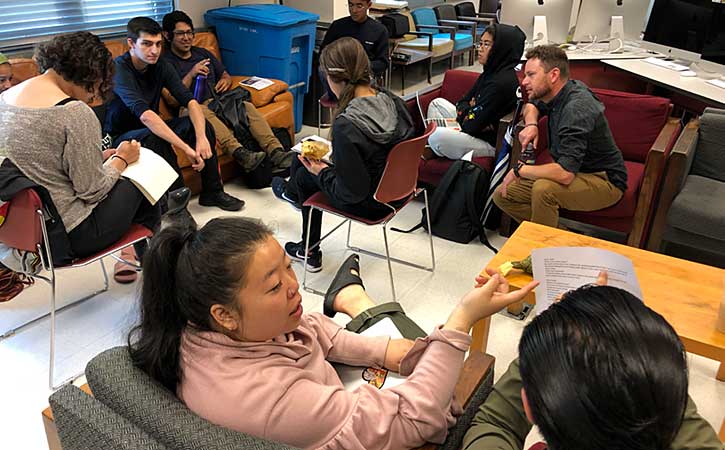The Bachelor of Arts in Journalism prepares students for today’s and tomorrow’s careers in journalism. Graduates demonstrate a working knowledge of the skills, laws, ethics, power and responsibilities of the news media.
Mission
To educate students and provide leadership in an evolving media landscape by promoting integrity, creativity, innovation and social responsibility in accurately telling the stories of a multicultural world.
Concentrations
The Department of Journalism offers two concentrations. You can view the bulletin links for additional information.
- Bachelor of Arts in Journalism: Concentration in Print and Online Journalism (bulletin)
- Bachelor of Arts in Journalism: Concentration in Photojournalism (bulletin)

The Bachelor of Arts in Journalism prepares students for careers in journalism. This is accomplished by providing instruction that requires students to demonstrate a working knowledge of the skills, laws, ethics, power and responsibilities of the news media. A strong liberal arts education also is required.
The main goals of the program's skills courses are to help students become accurate and thorough researchers; incisive thinkers who can gauge the quality of information; precise, clear and graceful writers; technically, aesthetically fine photojournalists; and competent digital technologists. Many students choose the major because these skills provide excellent preparation for numerous occupations, not only for journalism.
Faculty members have developed 14 competencies that they would like to see journalism students develop by the time they finish the program. At the end of the program we will assess our ability in helping you develop these competencies.
News Judgment
Work demonstrates news judgment that identifies and develops story ideas through observation, reading and paying attention to their environment.
Critical and Independent Thinking
Work demonstrates an ability to synthesize information and think independently and work through problems using inference and logic.
Cultural Competence
Work demonstrates an understanding of a variety of cultures and how those cultures influence perspectives, attitudes and personal interaction with the world.
Writing
Work demonstrates concise, clear, and accurate writing that engages the audience with compelling storytelling.
Analytical Competence
Work demonstrates an ability to discern and weigh the quality of information they gather, as well as know how to analyze and interpret it.
Research and Reporting
Work demonstrates an ability to methodically find information through the Internet, public documents and personal interviews.
Media Literacy
Work demonstrates an ability to competently navigate through a rapidly changing media world, understanding media’s influence on society, community and the democratic process, and that students also understand the power of image in shaping society’s understanding of the world.
News Media Law
Work demonstrates an understanding of the principles and laws of freedom of speech and press and the rights protected by the First Amendment.
Ethics
Work demonstrates an understanding of professional ethical principles and students work ethically in pursuit of truth, accuracy, fairness and diversity.
History
Work demonstrates an understanding of the history and role of journalists and journalism institutions in shaping the dissemination of information.
Critical Evaluation
Work demonstrates an ability to critically evaluate their own work and that of others for accuracy and fairness, clarity, appropriate style and grammatical correctness.
Data and Numbers
Work demonstrates an ability to apply basic numerical and statistical concepts.
Technology
Work demonstrates an ability to apply technology in their professional work.
Visual Competence
Work demonstrates an ability to research, find and capture in a technically competent, concise, well composed and visually compelling manner the gamut of human experience in a variety of formats.
Students in the Print/Online concentration are required to take introductory courses in research, reporting, writing, digital skills and editing. All students are required to take courses in multimedia journalism. Specialized courses for Print/Online students reflect different areas of expertise–feature writing, public journalism, opinion writing, investigative reporting, magazine writing, design courses and visual journalism for writers and editors. Students are strongly urged to develop speaking, writing, and listening competency in a second language.
Photojournalism concentration students are required to take introductory courses in writing, digital skills and reporting as well as courses in basic photography and news photography. All students are required to take courses in multimedia journalism. Photojournalism students gain expertise in lighting and telling stories through photographs. To understand the role of journalism in society, students also are required to take courses in mass media, journalism ethics and law, and cultural diversity. Students are strongly urged to develop speaking, writing, and listening competency in a second language.
Students that would like to enroll in either JOUR 409 Directed Study in Journalism or JOUR 699 Independent Study in Journalism will be required to submit a completed Independent Study Petition (pdf) to the Journalism deparment along with a copy of their unofficial transcript before enrolling in the course. The instructor's signature is required before submitting the petition. Petitions can be submitted by email to amberw@sfsu.edu.
Please note that JOUR 409 and JOUR 699 range from 1-3 units. When enrolling in the course, please make sure that you select the correct number of units that you plan to take in the drop-down menu.
Both JOUR 409 and 609 are CR/NR grading only.